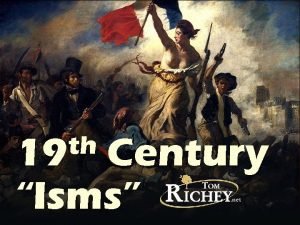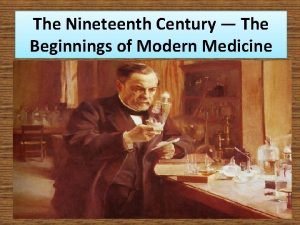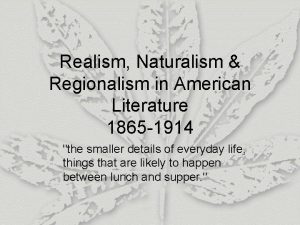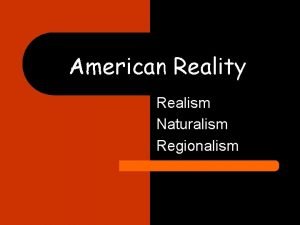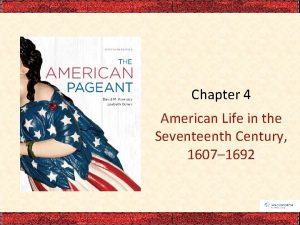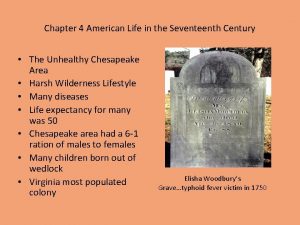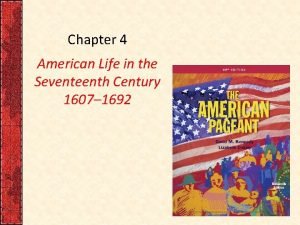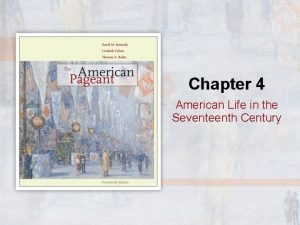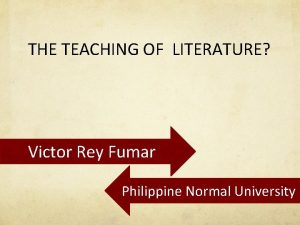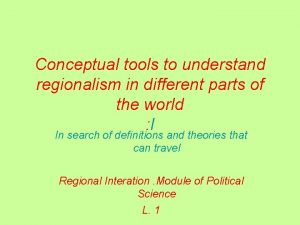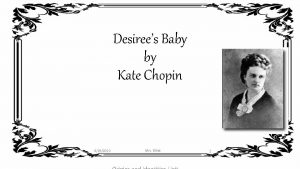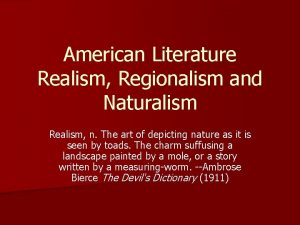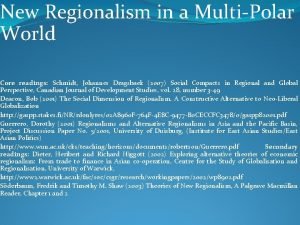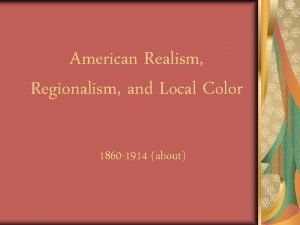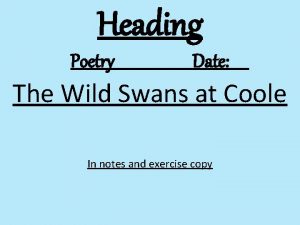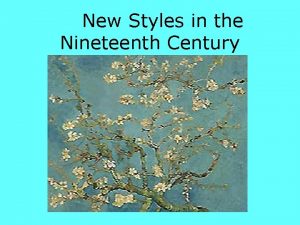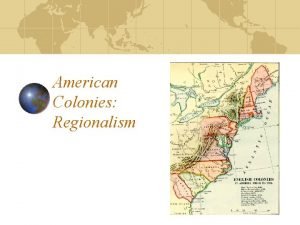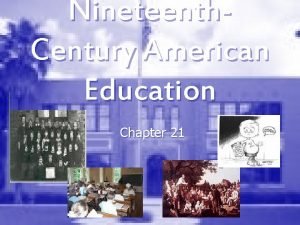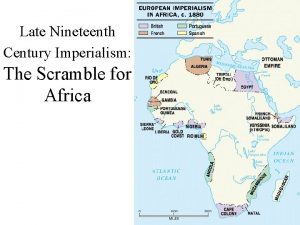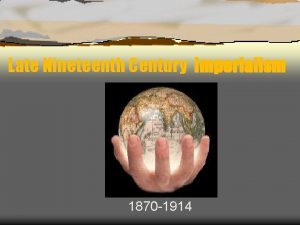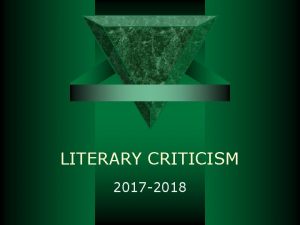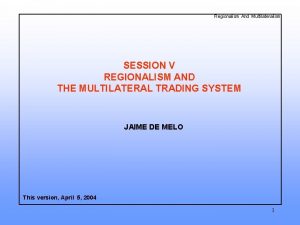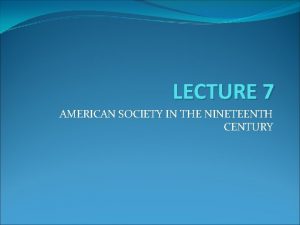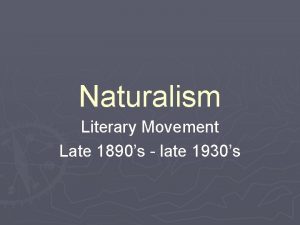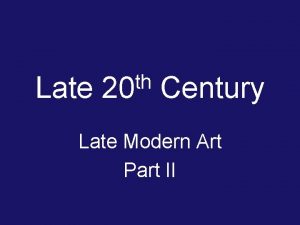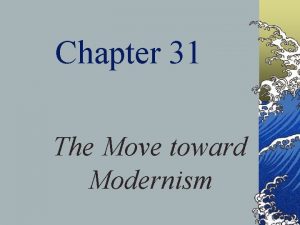RealismNaturalism Regionalism Late Nineteenth Century American Literary Techniques






































- Slides: 38

Realism--Naturalism Regionalism Late Nineteenth Century American Literary Techniques

Real--Natural--Regional • Reactions against Romanticism • Better described as “writing techniques” than “philosophies” • Naturalism developed from Realism • Regional writers could also be Realists or Naturalists

Real--Natural--Regional • Romantics / Transcendentalists tried to find the ideal; believed the individual was equal to a god • Realists focus on “the faithful representation of reality”; believed the individual was simply a person • Naturalists apply scientific principles to the study of humans without moralizing; believe the individual is a helpless object • Regionalists try to capture a location: description, dialect, traditions and heritage

Realism Humans control their own destinies; characters act on their environment rather than simply reacting to it. Character is superior to circumstance

Realism-Definition • About recreating life in literature: “the experienced commonplace. ” • Character more important than plot • Interpret the actualities of any aspect of life without idealism • Stresses the real over the fantastic • Emphasis on morality • Humans are in control of their own destinies

Realism-Characteristics • Character more important than action or plot; complex ethical choices • Characters appear in real complexity: temperament, motive, social class, past • Class is important • Events will be plausible • Diction is natural, written as people talk, not poetically

Realism in Literature • Settings thoroughly familiar to the writer • Plots emphasizing the norm of daily experience • Ordinary characters studied in depth • Responsible morality; a world truly reported

Naturalism Characters do not have free will; external and internal forces, environment, or heredity control their behavior. Determinism: free will does exist, but the will is often enslaved on account of different reasons.

In other words, people are caught within the forces of nature or society that are beyond their understanding or control

Naturalism-Definition • An extension or continuation of Realism with the addition of pessimistic determinism • Deals with raw and unpleasant experiences which reduce characters to “degrading” behavior in their struggle to survive • Set in the commonplace and unheroic; life is usually the dull round of daily existence

Naturalism-Characteristics • Objectivity and detachment in study of human beings; people are to be studied impartially, without moralizing about their natures/choices • Characters mostly from lower middle or the lower classes; poor, uneducated, unsophisticated • Discussion of fate; generally the controlling force is society and the surrounding environment

Naturalism in Literature • Naturalist introduced new topics to broaden the scope of American fiction: exposure of social conditions and social evils, lives of the lower classes • Characters conditioned and controlled by the environment, heredity, chance, or instinct • Struggle for life and to maintain human dignity becomes heroic

Regionalism • Also called “local color” literature • Focuses on the characters, dialect, customs, landscape, and other features particular to a specific region. • Typically a short story technique • May at times seem overly sentimental or nostalgic

Regionalism Setting Emphasis on nature and the limits it sets. Settings are frequently remote and are always integral to the story. Setting may sometimes become a character in itself.

Regionalism Characters Concerned with the character of the region rather than the individual; characters may become “character types” sometimes stereotypical. Marked by adherence to the old ways, dialect, and personality traits central to the region.

Regionalism Narrator Typically an educated observer from another area; serves as a go-between for audience and rural folk of the story Plots Little action; stories include storytelling by the characters and revolve around community and its rituals

Regionalism Themes • Antipathy toward change • Nostalgia for a past “golden age” • Celebration of community and acceptance in the face of adversity • Conflict between urban ways and oldfashioned rural values


Jack London 1876 -1916

• Jack London was born in San Francisco. He was deserted by his father, "Professor" William Henry Chaney, an itinerant astrologer, and raised in Oakland by his mother Flora Wellman, a music teacher and spiritualist. London's stepfather John London, whose surname he took, was a failed storekeeper.

• London's youth was marked by poverty. At the age of ten he became an avid reader, and borrowed books from the Oakland Public Library, where Ina Coolbirth recommended him the works of Flaubert, Tolstoy and other major novelists.

• After leaving school at the age of 14, London worked as a seaman, rode in freight trains as a hobo and adopted socialistic views as a member of the protest armies of the unemployed. In 1894 he was arrested in Niagara Falls and jailed for vagrancy.

• These years made him determined to raise himself out of poverty but they also gave later material for such works as The Sea-Wolf (1904), which was partly based on his horrific Writing The sea Wolf experiences as a sailor in the Pacific Ocean.

• Without having much formal education, London spent much time in public libraries reading fiction, philosophy, poetry, political science, and at the age of 19 gained admittance to the University of California in Berkeley. During this period he had already started to write.

• London left the school before the year was over and went to seek his fortune in the Klondike gold rush of 1897. His attempt was unsuccessful. London spent the winter near Dawson City, suffering from scurvy. In the spring he returned to San Francisco with his notebook full of plans for stories.

Jack London In Dawson

• For the remainder of 1898 London again tried to earn his living by writing. His early stories appeared in the Overland Monthly and Atlantic Monthly. In 1900 he married Elisabeth (Bess) Maddern; their home became a battle field between Bess and London's mother Flora. Three years later he left her and their two daughters, eventually to marry Charmian Kittredge, an editor and outdoorswoman. The marriage lasted until London's death. Charmian became the model of London's women characters, such as Paula in The Little Lady of the Big House (1916).



• In 1901 London ran unsuccessfully on the Socialist party ticket for mayor of Oakland. He started to steadily produce novels, nonfiction, and short stories, becoming in his lifetime one of the most popular authors. London had early built his system of producing a daily quota of thousand words. He did not give up even during his travels and drinking periods. London's first novel, The Son of the Wolf, appeared in 1900. By 1904 Jack London was the author of 10 books. The Son of the Wolf gained a wide audience as did his other Alaska stories, The Call of the Wild (1903), White Fang (1906), and Burning Daylight (1910).



Jack London’s Cottage


In His Estuary

• In 1902 London went to England, where he studied the living conditions in East End and working class areas of the capital city. Originally he set out for South Africa to report the Boer War. His book about the economic degradation of the poor, The People of the Abyss (1903), was a surprise success in the U. S. but criticized in England. London produced this classic of investigative reporting in seven weeks. In the middle of a bitter separation in 1904, London traveled to Korea as a correspondent for Hearst's newspapers to cover the war between Russia and Japan (1904 -05).

• Next year he published his first collection of non-fiction pieces, The War of the Classes, which included his lectures on socialism. In 1907 London and Charmian started aboard the Snark, the author's self-designed ketch, on a sailing trip around the world. On the voyage he began to write Martin Eden. After hardships - his captain was incompetent, the ketch was inefficient - they abandoned the journey in Australia. London's financial affairs were in chaos, his teeth gave him incessant pain, and he began to buy plots from a struggling writer, Sinclair Lewis, to produce more articles and stories for sale.

Jack London's grave in Jack London State Park, Glen Ellen, CA • A few months before his death, London resigned from the Socialist Party. Debts, alcoholism, illness, and fear of losing his creativity darkened the author's last years. He died on November 22, 1916, officially of gastro-intestinal uremia. However, there has been speculations that London committed suicide with morphine.
 Horace taylor the verdict september 25 1899
Horace taylor the verdict september 25 1899 The early and mid-nineteenth century: romanticism
The early and mid-nineteenth century: romanticism Nineteenth century isms review
Nineteenth century isms review Chapter 4 study of fibers and textiles
Chapter 4 study of fibers and textiles Nineteenth century
Nineteenth century Regionalism in literature
Regionalism in literature Regionalism vs naturalism
Regionalism vs naturalism Regionalism literature definition
Regionalism literature definition Regionalism literary movement
Regionalism literary movement Poetic devices in english
Poetic devices in english Chapter 4 american life in the seventeenth century
Chapter 4 american life in the seventeenth century American life in the seventeenth century
American life in the seventeenth century Chapter 4 american life in the seventeenth century
Chapter 4 american life in the seventeenth century Chapter 4 american life in the seventeenth century
Chapter 4 american life in the seventeenth century Example of tanaga poem
Example of tanaga poem State to state regionalism
State to state regionalism New regionalism
New regionalism New regionalism
New regionalism Difference between regionalism and federalism in a sentence
Difference between regionalism and federalism in a sentence New regionalism
New regionalism Jean courbet
Jean courbet What is regionalism in politics
What is regionalism in politics Corbeille desiree's baby
Corbeille desiree's baby Regionalism literature characteristics
Regionalism literature characteristics The new regionalism
The new regionalism Regionalism definition ap human geography
Regionalism definition ap human geography Local color realism
Local color realism Impressionism vs naturalism
Impressionism vs naturalism Examples of challenges of regionalism
Examples of challenges of regionalism Wild swans poem
Wild swans poem Fonctions techniques et solutions techniques
Fonctions techniques et solutions techniques Theme of huck finn
Theme of huck finn Who is the protagonist of the lottery
Who is the protagonist of the lottery Metaphor in a modest proposal
Metaphor in a modest proposal Gothic metaphors
Gothic metaphors Literary techniques in the scarlet letter
Literary techniques in the scarlet letter Literary devices in the scarlet letter
Literary devices in the scarlet letter A comparison not using like or as
A comparison not using like or as Literary elements and techniques
Literary elements and techniques


